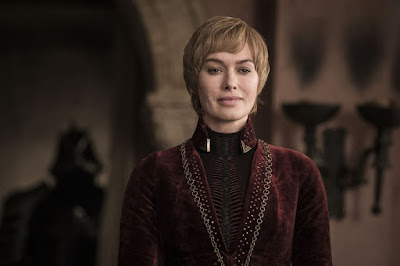For much of TV's existence, shows didn't have a planned ending. If a show was successful, it would simply keep running, episode after episode, season after season, until the Nielsen numbers went down and advertisers dried up and the network finally pulled the plug. There were very rarely finales or acknowledgments that the story was coming to an end. They simply ceased to exist. In more recent times, many series have a planned story to tell and exist expressly for the purpose of doing so. Breaking Bad is a good example, in which Vince Gilligan planned seven seasons and ended it on schedule. Deadwood was a victim of the old trend. HBO simply pulled the plug in 2006 and we were left, after three seasons, with several storylines which seemed as if they could have been given proper, or at least better, closure. But I think that's kind of an erroneous view, based on the unusual hybrid that Deadwood was, and I don't think this evening's film really did it any favors.
Putting aside a lot of story questions that the movie actually introduced, rather than resolved, such as why the seemingly terminally ill Doc Cochran was more hale and hearty than central character Al Swearengen, I think the very basis of the film was superfluous. In an odd way, similar to those older series that were callously swept away, Deadwood became a progression that wasn't really about telling an extended story. The plot mattered less and less as the seasons moved along and it became more about simply spending time with the wonderful characters that David Milch and his colleagues had created; in the same way that watching later seasons of All in the Family weren't because Archie Bunker had become the owner of a bar, but because it was a weekly opportunity to spend time with the acerbic central figure of the show. No better comparison can be made than between Al and Archie, both of them with execrable character flaws and an often shocking lack of humanity, but an earnestness of action that made them entrancing and, yes, even lovable. Trying to wrap up All in the Family with a two hour film would have left the same empty feeling as the Deadwood film did. That wouldn't have been the real Archie experience, in the same way that this wasn't Al or Seth Bullock or Jane or Dan or any of the rest.
In complete contrast, George Hearst's continuation as the Darth Vader of the piece was the most glaring piece of fan service among many. While everyone else had developed somewhat and mellowed with age and/or infirmity, Hearst was barely changed (and neither was Gerald McRaney, impressively), as were his actions. On the one hand, his continuing his path of theft, murder, and financial bullying was a measure of his contempt for the people he once had complete control over (financial, mental, emotional); peons to be manipulated or disposed of at his whim. On the other hand, doing so lacked any of the character's previous sense of subtlety and profound sense of perception for how people could be cadged into action, rather than simply threatened. This is even more focused because of him having risen from simple millionaire to US Senator (which is true of the actual Hearst), which takes some awareness of social interaction, even though Senators at the time were still appointed by whichever legislature they could buy off. His being beaten in the street by the same people that he scorned while now-marshal Bullock looked on in his own evident enjoyment was tossed out there for the fans to finally soak up. It's akin to Cersei having been killed by Arya or some other "just dessert" that many people would have wished, but which served the story and the character not at all.
Building the plot around Trixie's rash actions isn't new for the series and it allowed Paula Malcomson some room to continue her own path that she'd trod 13 years ago, with the birth of a child giving her space to admit her own self-worth ("Because I'm the bride and it's my special fucking day.") and finally allow Sol to marry her as what she finally felt: an equal. Plus, credit is due to Timothy Olyphant and Molly Parker for being able to convey the longing between Seth and Alma even after such a long time for both characters and actors. So, it's not as if the film is a total loss. But overall it was more of a Hallmark movie version of the show than the actual show. It lacked the dirt (despite the Gem still using a cloth banner for its main sign; one wonders how much of the set was still standing or had to be reconstructed) and the grime and the grinding intensity that the series conveyed so effortlessly. This was too clean and too easy. Perhaps it's as simple as Al not being himself and leaving the story without a center? Possible, but I think it's more complicated than that. The title of this piece is a line from Doc, acknowledging the mortality of everyone and everything. I prefer to think that the show bled its last 13 years ago, with the rougher image of the camp still firmly in my mind.
















